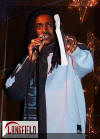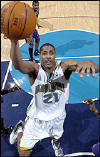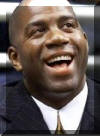|
| |
::EXCLUSIVE INTERVIEW::
LE
Newsletter -
April 22,
2004
| |
Interview With Nam
The cool and
gracious Namugenyi Kiwanuka
(affectionately referred to as “Nam”) granted me an interview this past
Sunday, April 18, 2004. I wanted to speak with her about her journey from MuchMusic to hosting and producing at NBA XL, a gig that she’s been in now
for almost six months. The former refugee of Uganda is what I would call a
renaissance woman – with humility and wisdom encompassing each anecdote. me an interview this past
Sunday, April 18, 2004. I wanted to speak with her about her journey from MuchMusic to hosting and producing at NBA XL, a gig that she’s been in now
for almost six months. The former refugee of Uganda is what I would call a
renaissance woman – with humility and wisdom encompassing each anecdote.
LE: Everyone knows that you’ve left MuchMusic and have moved over to your own
show at NBA XL (which airs every Wednesday evening). I want to go back to
the days just before you left MuchMusic. I remember your acceptance speech
at the UMAC Awards last summer and that you accepted the Best Media
Personality with a heavy heart as they just cancelled On the Downlo. Is
that the straw that broke the camel’s back as far as your decision to leave
MuchMusic?
NAM:
I think so. When you’re passionate about something and it doesn’t
translate with management, it’s frustrating. Downlo was a show that was
really needed on the air because it showcased up-and-coming talent. I’d ask
for input but I never felt like my suggestions were taken into
consideration. I felt like I was just the host of the show. I need to
be a part of it and if I’m representing a community or a culture of people,
I need to be able to try to be their voice and try to tell management what
people on the street wanted to listen to.
LE: Fans of MuchMusic often emailed and called Nam as there were so many changes to the format after our beloved Master T
left. Nam found herself with her hands tied. One of the major differences
was that Master T also produced his show and had almost exclusive control of
what videos were aired and what guests were invited to the studio. The
changes in the format were immediate. One of the issues that troubled Nam
was the lack of reggae and dancehall videos. When she expressed her
concerns to management, she was told that MuchMusic was a national station
and did not just cater to Toronto. Huh? Apparently, the perception was
that Canadian reggae and dancehall fans lived exclusively in Toronto. In
fairness, Nam states “I can understand from management’s point of view, up
until Sean Paul started putting out some really clean videos, a lot of the
dancehall videos were shot on High 8 and the quality was not that great. At
the same time too, we are required to play Canadian Content (“Cancon”) and
some of the Cancon videos are not the best because they’re working with a
limited budget but we still aired them. The question is, are we airing them
because we want to support the music or because we’re required to by the
CRTC. I didn’t really want to be a puppet and I felt like I was puppet.”
changes to the format after our beloved Master T
left. Nam found herself with her hands tied. One of the major differences
was that Master T also produced his show and had almost exclusive control of
what videos were aired and what guests were invited to the studio. The
changes in the format were immediate. One of the issues that troubled Nam
was the lack of reggae and dancehall videos. When she expressed her
concerns to management, she was told that MuchMusic was a national station
and did not just cater to Toronto. Huh? Apparently, the perception was
that Canadian reggae and dancehall fans lived exclusively in Toronto. In
fairness, Nam states “I can understand from management’s point of view, up
until Sean Paul started putting out some really clean videos, a lot of the
dancehall videos were shot on High 8 and the quality was not that great. At
the same time too, we are required to play Canadian Content (“Cancon”) and
some of the Cancon videos are not the best because they’re working with a
limited budget but we still aired them. The question is, are we airing them
because we want to support the music or because we’re required to by the
CRTC. I didn’t really want to be a puppet and I felt like I was puppet.”
Maybe that’s what they wanted to limit your role to. Maybe they felt that
Master T had too much power.
NAM:
It’s been said and I’ve heard that before. I learned a lot from those
experiences but if I’m walking on the street and I’m supposed to represent
this artist who’s trying to make a dollar, but they’re not getting any kind
of support, I can’t call myself a supporter or a lover of the music if I’m
just standing there doing what I’m told. It wasn’t fun anymore.
LE: Do you think that your experience translates into the Canadian music
industry?
NAM:
You hear certain artists on so-called Black radio and then you hear
other artists on rock_small.jpg) stations. If you’re dominating the airwaves like
that, obviously you’re going to reach a larger audience. I think someone
like K-OS becomes so marginalized. A fact that’s always been interesting to
me has been never in Canadian history have we broken an urban artist. It’s
NEVER been done. Maestro
came close to it and Rascalz kind of
did; I’m speaking outside of Canada. You’ve got Avril, Sum 41, Barenaked
Ladies, Sarah McLachlin. You can go on and on about other genres of music
that have broken in the States but never have they broken an urban artist.
I have to sit back and say “Why?” When it comes to urban artists in Canada,
I see why they leave. There’s no point in staying here. Your own country
is not supporting you for whatever reason. In the States for two years in a
row, urban music was the #1 selling genre. I don’t get it. stations. If you’re dominating the airwaves like
that, obviously you’re going to reach a larger audience. I think someone
like K-OS becomes so marginalized. A fact that’s always been interesting to
me has been never in Canadian history have we broken an urban artist. It’s
NEVER been done. Maestro
came close to it and Rascalz kind of
did; I’m speaking outside of Canada. You’ve got Avril, Sum 41, Barenaked
Ladies, Sarah McLachlin. You can go on and on about other genres of music
that have broken in the States but never have they broken an urban artist.
I have to sit back and say “Why?” When it comes to urban artists in Canada,
I see why they leave. There’s no point in staying here. Your own country
is not supporting you for whatever reason. In the States for two years in a
row, urban music was the #1 selling genre. I don’t get it.
LE: It’s interesting, when I was interviewing Jazzy Jeff last week, he was
bigging up Canada and its support of its artists.
NAM: I think the fact that Canadian hip hop is very different musically from
American hip hop, obviously because of different experiences and our
population has much more of a West Indian influence. I think it’s great
that the CRTC has the Cancon stipulation because otherwise, would the music
get any support? You’ve got to go one step more. Are you just playing
the videos because you are required to? I’m
still trying to support the music at NBA XL and Petal (Baptiste)
and Andrea
(Chrysanthou) at MuchMusic still do that because they’re part of the
community. Maybe that’s what Jazzy was referring to. That’s why we’re all
here – to push it to that next level so everybody outside of Canada can see
the jewels and the talent that is here.
LE: When did you first fall in love with basketball?
NAM: I used to play basketball in high school. I was a shooting guard. I
stopped playing because I had to get a full time job while I was in high
school. I remember at one point on air at MuchMusic, I would get all these
emails saying “Stop talking about basketball!” because that’s all I’d talk
about! This is the second year doing XL. Last year they approached me to
do the show full time and I said let’s see if we can work it out so I can
do both. So, they worked out a deal. There was a synergy there
and I
would share interviews with MuchMusic and NBA XL. This year when they came
back to me, I had to weigh my options. There was something else that I
wanted to do because in addition to being the host of the show, they also
offered me a position as an associate producer and I couldn’t say no to
that.
LE: Are you happy?
NAM:
Extremely happy! I miss the people that I used to work with at
MuchMusic - it became like family. I started out as an intern so I kind of
grew up there. That’s one thing that I’ll always have close to MuchMusic.
CHUM is an incredible organization to be part of. Sooner
or later though you’ve got to make the choice to move on. I almost stayed
at MuchMusic because I thought maybe I could move around within CHUM and who
knows, maybe that will still be an option but I had to say “Let’s see what
happens”. MuchMusic was comfortable for me – it was fun, I got paid, I got
to hang out with my friends. family. I started out as an intern so I kind of
grew up there. That’s one thing that I’ll always have close to MuchMusic.
CHUM is an incredible organization to be part of. Sooner
or later though you’ve got to make the choice to move on. I almost stayed
at MuchMusic because I thought maybe I could move around within CHUM and who
knows, maybe that will still be an option but I had to say “Let’s see what
happens”. MuchMusic was comfortable for me – it was fun, I got paid, I got
to hang out with my friends.
LE: Just the opportunity to have creative control again must be fulfilling
compared with constantly being frustrated.
NAM: For a long time, I felt as if you’re here because you look a certain way
even though that’s not the way I started. I worked my way up. My old boss,
Denise Donlan, who is now Sony’s
music president, was incredible because she would push me to challenge
myself and she was never complacent with what I did. I liked that because
it was empowering.
LE: What’s your favourite part of your new gig?
NAM: The favourite part of my new job is that I’m in an environment where I’m
being encouraged to explore all aspects of my talent from hosting, to
interviewing, to producing. I like being in an editing suite and
collaborating with an editor. I’m always encouraged to challenge myself.
I don’t want to just do this either. I eventually want to own my own
station. Some people might think that’s a little bit too optimistic
but I really want to do that. That’s why I’m setting myself up the way that
I am. The challenge is not allowing people to define who you are and
showing people what you can do. When Denise (Donlan) was still my boss, she
asked me what I wanted to do in a few years. I said that I wanted to have
her job. She understands that. She was also someone who worked
her way
up. She was a roadie, a manager, she was on air, and a producer. Now she’s
running a music company.
I decided to pitch an idea to Sportsnet to see if I could do a documentary
on
Jamaal Magloire.
He’s accomplished what only three basketball players from Canada have done,
which is to be in the NBA. And they let me do it! It shows that NBA Canada
has a lot of confidence in their players. Magloire.
He’s accomplished what only three basketball players from Canada have done,
which is to be in the NBA. And they let me do it! It shows that NBA Canada
has a lot of confidence in their players.
LE: So, you’re doing a documentary on
Jamaal Magloire
–how did it all transpire?
NAM:
Jamaal did something
with the MMVAs last year. They knew I was a big basketball fan and they
asked who I thought should be invited and I suggested Jamaal. It got me
thinking that not many people know who he is and he doesn’t get the amount
of media coverage that say, Steve Nash gets. So when I started at Sportsnet,
I was thinking that I want to do a documentary because I like working on
them. Once they said yes, everything just happened. He got on the All Star
team – he becomes the second Canadian in NBA history to be an all star and
he’s the first one from Toronto. He was named Eastern Conference Player of
the Week – he’s had a really good season. Plus, on the personal side, a few
years ago, his brother, Justin Sheppard
was murdered and his case is still unresolved. So, he has an
interesting history and the few times that I’ve met him, he’s a great guy.
And it just started out like that.
Nam said that the documentary will be an overview of Jamaal’s career. It
starts off from this year when he was at the All Star game. She’s talked to
his past coaches, fellow teammates, etc. This special Canadian documentary
will air on
May 6th on Sportsnet.
LE: And the least favourite part of your new job?
NAM:
That it’s in Scarborough. No offence to everybody who lives in Scarborough
but I’m downtown girl. But it’s saved me a lot of money from shopping on
Queen Street W.!
LE: Who’s your all-time favourite player to interview and why?_small.jpg)
NAM: I’d have to say Allen Iverson.
Because here’s someone that’s not as physically big as the other players.
For the past three years, he’s been playing injured. One time last year,
they actually did a diagram on ESPN of all the injuries that he was dealing
with. And he still played. I can identify with that because no matter how
many times you get knocked down, you need to get back up. The more times
you get up, the stronger you become. I think he has a lot of heart and he’s
a warrior.
LE: Who’s your all-time favourite player overall and why?
NAM: I’d have to say Magic Johnson.
Not only for what he did on the basketball court but who he is as a man.
People can argue back and forth about
how he cheated on his wife or how he
contracted HIV. I don’t know that. As a result of what happened, he has
become a stronger man. Martin Luther King Jr. has a quote “The ultimate
measure of a man is not where he stands in moments of comfort and
convenience, but where he stands at times of challenge and controversy.”
When Magic found out that he was HIV positive, he didn’t have to tell
anybody. People could have speculated but he came forward and he started
educating people. He also opened all these businesses in Compton and he
opened the Magic Johnson Theatre where people can go and feel safe. He’s
really used that adversity to impact millions of people. It’s not just
about what you do on the basketball court or as a basketball player, but how
you define yourself as a man. People will remember him 20 years from now,
not only for what he did on the court but what he did as man. as a man.
People can argue back and forth about
how he cheated on his wife or how he
contracted HIV. I don’t know that. As a result of what happened, he has
become a stronger man. Martin Luther King Jr. has a quote “The ultimate
measure of a man is not where he stands in moments of comfort and
convenience, but where he stands at times of challenge and controversy.”
When Magic found out that he was HIV positive, he didn’t have to tell
anybody. People could have speculated but he came forward and he started
educating people. He also opened all these businesses in Compton and he
opened the Magic Johnson Theatre where people can go and feel safe. He’s
really used that adversity to impact millions of people. It’s not just
about what you do on the basketball court or as a basketball player, but how
you define yourself as a man. People will remember him 20 years from now,
not only for what he did on the court but what he did as man.
LE: As one of the few Canadian Black women in the world of sports journalism,
what are the challenges you face?
NAM: I’m just me doing my job. My bosses at Sportsnet have been great. I
feel happy to be in an environment where it’s more about the work that I do
and not the way that I look.
LE: Nam’s natural and striking hair has been the subject of way too many
conversations, for which she does not understand. But it does seem
clear that the way you look (or don’t look) matters far too much in our
society. Nam is much more concerned with the message that she is
conveying.
NAM:
What does my hair have to do with what comes out of my mouth or how I
conduct myself professionally? Or my work ethic. It has nothing
to do with it. Just because you are not used to it ... Black
women have hair like this – it’s not something that should even be an issue.
LE: What would you tell a young woman wanting to enter this arena?
NAM:
Education. A lot of people say that you don’t need a degree to get by and
that’s they’re opinion but the thing that I’m most proud of in my life is my
degree. I put myself through journalism school and I finished it and have a
journalism degree. I always tell people that if this is what you want to
do, get into it for the right reasons i.e. where you have a career planned.
You don’t want to be exploited because that happens a lot and you don’t want
to undermine the other people in that business. Don’t think that it has to
do with what you look like because it doesn’t. It’s a very competitive
business. You really need to know what you’re doing.
I think how women are perceived - it’s either you’re a pretty girl or you’re
a groupie - those are the two extremes. So, the one thing that I will say
to a young woman, is that you need to take pride in yourself. You need to
represent yourself and carry yourself in a manner where you’re proud of who
you are. It comes down to your credibility and credibility is such a big
thing.
LE: How would you like to be remembered? What kind of legacy would you like
people to remember you for?
NAM: That I was sincere. That I wasn’t fake. I think that TV can pick up on
that. TV doesn’t lie. You’re making eye contact and your eyes are the
windows of the soul. I think two qualities that I’m proud of are my loyalty
and my sincerity. And that I’m not fake. Sometimes that works against me
because if I don’t like you, you will know it. You will see it in my eyes.
It takes a lot for me not to like somebody but sometimes my gut instinct
tells me that you’re not good people. I can usually tell when there’s a
certain energy between me and someone else. I’m not fake and I take pride
in what I do.
Namugenyi Kiwanuka – certainly not a fake but rather a convincing role
model for women of any age, race or credo. I seek out people with such
integrity and humility – not qualities that are often recognized in this
society (and scarcely in the entertainment business) but one that I, myself,
celebrate and aspire to.
Good luck Nam in all your future ventures and we’ll be watching. Don’t
forget to tune in on May 6th for her documentary on
Jamaal Magloire. |
|
| |
|